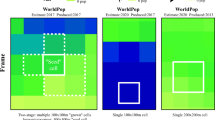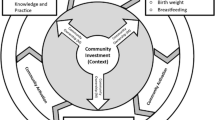Abstract
Community mobilization is an integral process of raising awareness and increasing participation in a specific program. Communities with long-standing mistrust of health research may otherwise be reluctant to participate in surveys originating outside of their locality, particularly when asked to share personal information, provide blood samples, or undergo medical examinations. Here we discuss the community mobilization approaches undertaken by the Population-based HIV Impact Assessment (PHIA) project to optimize participation in surveys across 13 countries of sub-Saharan Africa. The PHIA Project developed a community mobilization strategy to address anticipated community concerns. In each country, a trained cadre of Community Mobilization Coordinators (CMCs) facilitated (1) ongoing communication with leadership and stakeholders at national, provincial/district and local levels; (2) door-to-door visits and group meetings; (3) promotional material dissemination through radio and television jingles and mass social/community media; and (4) the use of public address systems to enhance survey awareness and promote participation. Response rates (RR) were recorded from each survey. The PHIA surveys’ mobilization efforts cultivated a receptive environment for data collection. The average household response rate for 13 PHIA surveys was 90.4% and interview RR were consistently over 80%, with women more likely to conduct an interview in all countries except Cote d’Ivoire. 89% of eligible women consented to a blood draw and 81.1% of eligible men consented. The robust and contextualized community mobilization approaches in PHIA were critical for engaging communities in large-scale public health surveys and contributed to high RR in participant interviews and blood draw.
Similar content being viewed by others
References
UNAIDS. (2014). 90–90–90: An ambitious treatment target to help end the AIDS epidemic. Retrieved from Geneva: https://www.unaids.org/sites/default/files/media_asset/90-90-90_en.pdf
Lippman, S. A., Neilands, T. B., MacPhail, C., Peacock, D., Maman, S., Rebombo, D., Twine, R., Selin, A., Leslie, H. H., Kahn, K., & Pettifor, A. (2017). Community mobilization for HIV testing uptake: Results from a community randomized trial of a theory-based intervention in rural South Africa. Journal of Acquired Immune Deficiency Syndromes (1999), 74(Suppl 1), S44–S51. https://doi.org/10.1097/QAI.0000000000001207
Blanchard, A. K., Mohan, H. L., Shahmanesh, M., Prakash, R., Isac, S., Ramesh, B. M., & Blanchard, J. F. (2013). Community mobilization, empowerment and HIV prevention among female sex workers in south India. BMC Public Health, 13(1), 234. https://doi.org/10.1186/1471-2458-13-234
Tedrow, V. A., Zelaya, C. E., Kennedy, C. E., Morin, S. F., Khumalo-Sakutukwa, G., Sweat, M. D., & Celentano, D. D. (2012). No “magic bullet”: Exploring community mobilization strategies used in a multi-site community based randomized controlled trial: Project accept (HPTN 043). AIDS and Behavior, 16(5), 1217–1226. https://doi.org/10.1007/s10461-011-0009-9
MacQueen, K. M., Bhan, A., Frohlich, J., Holzer, J., Sugarman, J., & Ethics Working Group of the HIV Prevention Trials Network. (2015). Evaluating community engagement in global health research: the need for metrics. BMC Medical Ethics, 16, 44. https://doi.org/10.1186/s12910-015-0033-9
Tindana, P. O., Singh, J. A., Tracy, C. S., Upshur, R. E., Daar, A. S., Singer, P. A., Frohlich, J., & Lavery, J. V. (2007). Grand challenges in global health: Community engagement in research in developing countries. PLoS Medicine, 4(9), e273. https://doi.org/10.1371/journal.pmed.0040273
Simwinga, M., Bond, V., Makola, N., Hoddinott, G., Belemu, S., White, R., Shanaube, K., Seeley, J., Moore, A., & HPTN 071 (PopART) Study Team. (2016). Implementing community engagement for combination prevention: lessons learnt from the first year of the HPTN 071 (PopART) community-randomized study. Current HIV/AIDS reports, 13(4), 194–201. https://doi.org/10.1007/s11904-016-0322-z
Boahen, O., Owusu-Agyei, S., Febir, L. G., Tawiah, C., Tawiah, T., Afari, S., & Newton, S. (2013). Community perception and beliefs about blood draw for clinical research in Ghana. Transactions of the Royal Society of Tropical Medicine and Hygiene, 107(4), 261–265. https://doi.org/10.1093/trstmh/trt012
Acknowledgements
The authors thank PEPFAR, ICAP, CDC, and MOH affiliates for their work on the day-to-day implementation of the PHIA project including, but not limited to, successful community mobilization efforts. Additionally, thank you to the community mobilization leads in each country including the Community Mobilisation Coordinators (CMCs) & the Community Mobilisers (CMs) and all participants involved in the PHIA surveys. Thank you, Rachel Bray, for assisting with data analysis.
Funding
The PHIA surveys were supported by the President’s Emergency Plan for AIDS Relief (PEPFAR) through the US Centers for Diseases Control and Prevention under the terms of Cooperative Agreements 1U2GGH000994 and 5NU2GGH001226. The findings and conclusions in this article are those of the authors and do not necessarily represent the official position of the funding agencies.
Author information
Authors and Affiliations
Corresponding author
Ethics declarations
Conflict of interest
The authors drawn from participating organizations in the PHIA surveys have no relevant financial or non-financial interests to disclose and have no competing interests to declare that are relevant to the content of this article. There was no direct or specific funding for this manuscript.
Additional information
Publisher's Note
Springer Nature remains neutral with regard to jurisdictional claims in published maps and institutional affiliations.
Rights and permissions
About this article
Cite this article
Phiri, B., Guhathakurta, A., Wright, C. et al. Community Mobilization Approaches for Large-Scale Public Health Surveys: Experiences from the Population-based HIV Impact Assessment (PHIA) Project. J Community Health 47, 620–626 (2022). https://doi.org/10.1007/s10900-022-01088-2
Accepted:
Published:
Issue Date:
DOI: https://doi.org/10.1007/s10900-022-01088-2




